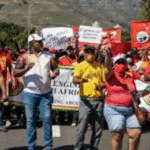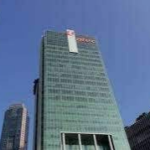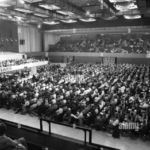The Congress of South African Trade Unions (COSATU) has played a pivotal role in advocating for workers’ rights and advancing social justice in South Africa since its establishment in 1982. As the largest trade union federation in the country, COSATU focuses on improving labor practices, wages, and working conditions while addressing broader socio-economic issues. This blog post explores COSATU’s history, structure, key functions, and challenges it faces in contemporary society. It highlights the organization’s collaboration with political movements and its ongoing commitment to inclusivity, innovation, and advocacy for marginalized communities, ensuring its continued relevance in the changing labor landscape.

Introduction to the Congress of South African Trade Unions (COSATU)
The Congress of South African Trade Unions, commonly referred to as COSATU, is a pivotal organization in South Africa’s labor landscape. Established in 1982 amidst the struggle against apartheid, COSATU was born from the unification of various trade unions that sought to better represent the rights and interests of workers in a rapidly changing socio-political environment. Its formation was crucial not only for labor rights but also for the broader movement towards a democratic South Africa.
COSATU serves as an umbrella organization for numerous affiliated trade unions, encompassing a wide range of sectors including mining, manufacturing, and public services. With millions of members, COSATU is recognized as the largest trade union federation in the country. Its significance extends beyond union representation; it plays a vital role in advocating for social justice, equitable policies, and economic reform aimed at addressing the deep-rooted inequalities left in the wake of apartheid.
The primary objectives of COSATU revolve around ensuring fair labor practices, improving wages, and enhancing working conditions for its members. The organization also encompasses advocacy for broader socio-economic issues, such as women’s rights, youth development, and education, making it an influential voice in South African society. By aligning with political movements and engaging in policy discussions, COSATU not only protects workers’ rights but also drives change towards a more inclusive economy.
In the realm of labor relations, COSATU’s role extends to negotiating collective agreements, promoting solidarity among various unions, and fostering collaboration with international labor organizations. As such, understanding COSATU’s history, objectives, and functions is essential for comprehending the dynamics of South Africa’s labor movement and the ongoing pursuit for workers’ rights in the post-apartheid era.
Historical Background of COSATU
The Congress of South African Trade Unions (COSATU) was established in 1982 amidst the anti-apartheid movements that swept through South Africa. Its formation can be viewed as a response to the apartheid government’s oppressive policies, which marginalized the majority of the population and restricted their labor rights. Prior to COSATU’s inception, the labor movement was fragmented, with various unions operating independently and often failing to address the broader socio-economic issues affecting workers. The need for a united trade union federation led to the merger of several trade unions, primarily focused on elevating the rights and conditions of black workers.
During the 1980s, South Africa was engulfed in social unrest fueled by the injustices of apartheid. Trade unions became instrumental in galvanizing the opposition against the government. COSATU quickly grew in strength and influence, representing a diverse range of occupations, including essential sectors such as mining, transportation, and education. The federation not only fought for better wages and working conditions but also played a crucial role in the broader struggle for political freedom. Key events during this period included the 1987 miners’ strike, which highlighted the power of organized labor and brought significant attention to the plight of workers.
As COSATU evolved through the 1990s, it became a foundational pillar of the new democratic South Africa. The federation actively participated in the negotiations for a new constitution, advocating for labor rights and social justice. The role of COSATU expanded from merely a labor organization to a significant player in the nation’s socio-political landscape. The organization’s commitment to both workers’ rights and political reform established it as a vital component of the labor movement, influencing not only the immediate economic conditions of South African workers but also the broader democratic processes in the country.

Structure and Governance of COSATU
The Congress of South African Trade Unions (COSATU) operates through a well-defined organizational structure that enhances its effectiveness as a federation representing various trade unions across South Africa. Central to this structure is the leadership framework, which features a General Secretary at the helm, supported by a Deputy General Secretary and various officials who oversee specific portfolios. This leadership team is elected by delegates from member unions during the COSATU congress, ensuring that the governance of the federation reflects the democratic will of its affiliates.
COSATU’s governance is further characterized by its regional structures, which align with South Africa’s geographical divisions. These regions play a crucial role in mobilizing grassroots members and coordinating efforts to address local labor issues. Each region has its own leadership team responsible for implementing COSATU’s policies and initiatives at the local level, thereby fostering a closer connection between the federation and its members. This decentralized approach enables COSATU to be responsive to the diverse needs and priorities of its affiliates.
Affiliated unions constitute a vital part of COSATU’s governance structure. As of now, COSATU includes several prominent trade unions representing various sectors, including manufacturing, services, and public industries. Each affiliate retains autonomy over its internal governance but must abide by the broader policies and decisions made at the COSATU level. The decision-making process within COSATU is largely participatory, with significant input coming from affiliate unions during national conferences and executive meetings. This ensures a diverse representation of interests and strengthens solidarity among the union members. Ultimately, COSATU’s structure and governance reflect its commitment to advocating for workers’ rights while maintaining a unified front in addressing labor issues across all sectors.
Key Functions and Activities of COSATU
The Congress of South African Trade Unions (COSATU) plays a pivotal role in the labor landscape of South Africa. One of its primary functions is collective bargaining, which involves negotiating better wages, working conditions, and benefits for its members. Through strategically organized negotiations with employers and various industry stakeholders, COSATU strives to secure fair labor practices and uphold workers’ rights. This process not only empowers the workforce but also strengthens the economic standing of its members within various sectors.
Another significant function of COSATU is political advocacy. The organization actively engages with government bodies, both at a national and local level, to influence policies that impact the labor force. This includes lobbying for legislation that promotes workers’ rights, social justice, and equitable economic growth. By fostering partnerships with other civil society organizations and alliances, COSATU amplifies its voice on key issues affecting its members, such as unemployment, inequality, and workers’ health and safety. Such advocacy ensures that the interests of workers are represented in broader policy discussions.
Additionally, COSATU provides essential member services, which include education and training programs aimed at enhancing workers’ skills and knowledge. These initiatives are intended to empower members towards personal development and career advancement, equipping them with the tools needed to succeed in an ever-evolving job market. Furthermore, COSATU offers support in legal matters, ensuring that its members have access to advice and representation when needed. By fulfilling these functions and engaging in various activities, COSATU remains a vital entity in promoting labor rights and enhancing the welfare of workers across South Africa.
COSATU’s Role in National Politics

The Congress of South African Trade Unions (COSATU) has established itself as a significant player in the political landscape of South Africa since its inception in 1982. As a federation of trade unions, COSATU’s primary objective has been to advocate for workers’ rights while simultaneously influencing national policies pertaining to labor and socio-economic issues. One of COSATU’s most notable relationships is with the African National Congress (ANC), the ruling political party since the end of apartheid.
The alliance between COSATU and the ANC has been pivotal in shaping labor laws and national policies. COSATU’s active participation in the formation of the ANC’s policy framework has ensured that the labor movement’s concerns are integrated into the government’s agenda. This relationship facilitates not only the representation of labor interests but also empowers COSATU to influence legislation that significantly impacts workers across various sectors. For example, COSATU played an essential role in advocating for labor reforms, including the enactment of the Labour Relations Act and the Basic Conditions of Employment Act, which provide fundamental rights and protections for workers.
Furthermore, COSATU has utilized its substantial membership base, which comprises millions of workers, to mobilize support during national elections, thereby enhancing the political clout of the ANC. The federation has organized numerous protests and strikes to highlight critical issues such as unemployment, wage disparities, and social justice, effectively keeping labor issues at the forefront of political discussions.
Despite its close ties with the ANC, COSATU has criticized the party at times, particularly regarding economic policies perceived as favoring capital over labor interests. This dynamic interplay showcases COSATU’s role not only as a collaborator but also as a watchdog over the political commitments made by the ANC.
Challenges Faced by COSATU
The Congress of South African Trade Unions (COSATU) has encountered a variety of challenges that hinder its operational effectiveness and overall impact. One significant challenge is the ongoing evolution of the labor market. The shift towards a more flexible labor market has introduced complexities that COSATU must navigate carefully. With the rise of gig economies and freelance work, traditional employment structures are changing, which has implications for how trade unions engage their members. Many workers in modern economies often conduct their work outside of conventional employment frameworks, leading to decreased union membership and engagement.
Additionally, internal dissension poses another challenge for COSATU. The organization, composed of various affiliated unions, faces complexities in maintaining cohesion among its members. Disagreements over leadership, strategy, and political direction have the potential to weaken the collective bargaining power essential for any trade union. Such internal strife may result in a fragmented organization that struggles to present a united front against employers or to advocate effectively on behalf of its members’ interests.
Economic constraints also significantly affect COSATU’s ability to fulfill its mandate. South Africa’s economic landscape has been marked by slow growth, high unemployment, and increased poverty rates, which exacerbate the challenges faced by trade unions. Financial limitations restrict the resources available for organizing campaigns and strategic initiatives, weakening COSATU’s overall influence. As the organization grapples with these constraints, it also faces the overarching impact of globalization. The interconnectedness of global economies means that local labor issues are often influenced by international market dynamics. COSATU must strategically adapt to these changes, seeking innovative approaches to member engagement and advocacy in a rapidly changing global environment.
COSATU and Social Justice Movements

The Congress of South African Trade Unions (COSATU) plays a pivotal role in advocating for social justice in South Africa. Established to represent workers’ interests, COSATU has expanded its mandate to include broader social issues, encompassing gender equality, economic inequality, and human rights. Through its various initiatives, COSATU aligns itself with community activism, recognizing that the struggles of workers are interlinked with social justice at large.
COSATU’s engagement with gender equality is particularly notable. The organization actively promotes women’s rights within the labor market, addressing issues such as unequal pay, workplace harassment, and lack of representation. By organizing workshops and campaigns, COSATU increases awareness of gender disparities, encouraging both male and female members to advocate for equality in the workplace. This initiative reflects a comprehensive understanding of the necessity for gender equity as a vital component of social justice.
In addition to gender issues, COSATU addresses economic inequality, advocating for fair wages and better working conditions. The federation emphasizes the need for the government and businesses to create a balanced economic landscape that uplifts marginalized communities. By championing living wage campaigns and striving for equitable labor practices, COSATU positions itself as an essential player in the ongoing fight against poverty and unemployment in South Africa.
Furthermore, COSATU is actively involved in human rights advocacy, recognizing that violations of rights are not just legal issues but social justice concerns. The organization partners with various NGOs and civil society groups to campaign for the rights of workers and communities, striving to create a more equitable society for all South Africans. This collaboration underlines COSATU’s commitment to integrating social justice within its core labor agenda.
The Future of COSATU

The Congress of South African Trade Unions (COSATU) stands at a critical juncture, necessitating adaptation and resilience in response to the evolving economic and political landscape of South Africa. As South Africa continues to confront challenges that include unemployment, inequality, and the impact of global economic trends, COSATU’s future will largely hinge on its ability to navigate these complexities while remaining true to its foundational goals of advancing workers’ rights.
One of the primary strategies for COSATU will be to strengthen its alignment with various social movements and political alliances. By collaborating with civil society organizations, community groups, and other labor unions, COSATU can enhance its collective bargaining power and broaden its influence in advocating for progressive policies. This partnership approach will be vital in mobilizing grassroots support and fostering a unified voice that effectively addresses the pressing issues facing workers across different sectors.
Furthermore, embracing innovation and leveraging technology will be essential for COSATU to remain relevant in the 21st century labor landscape. This includes utilizing digital platforms for organizing, communication, and advocacy, enabling COSATU to reach a wider audience and engage younger generations of workers. By prioritizing education and training regarding emerging technologies and changing labor market dynamics, COSATU can empower its members to adapt to new job requirements and secure better employment opportunities.
Enhancing COSATU’s role in the labor movement also requires a commitment to inclusivity. Ensuring that marginalized groups, including women, youth, and workers in the informal sector, have a voice within the organization will not only strengthen solidarity but also contribute to more equitable labor practices. Such inclusivity will be pivotal in addressing the diverse needs and aspirations of all workers in an increasingly complex socio-economic environment.
In conclusion, the future of COSATU will depend on its capacity to adapt to changing dynamics while fostering alliances, embracing technology, and promoting inclusivity. As these strategies are implemented, COSATU can reinforce its position as a leading advocate for workers’ rights and social justice in South Africa.
Conclusion
In summary, the Congress of South African Trade Unions (COSATU) has played a pivotal role in shaping the landscape of labor rights and advocacy within South Africa. Established in 1982, COSATU emerged from the necessity to unite various trade unions in the struggle against apartheid and to protect the rights of workers across diverse sectors. The organization’s rich history is marked by its unwavering commitment to improving working conditions, advocating for fair wages, and combating socio-economic inequalities faced by workers.
Its structure, comprising various affiliate unions, demonstrates solidarity and collective bargaining power, allowing it to effectively represent the interests of millions of South African workers. Through mobilization, COSATU has not only sought to enhance labor rights but has also influenced broader socio-political issues such as education, health care, and housing, establishing itself as a significant player in the national discourse. Furthermore, the organization faces a myriad of challenges, including shifts in the political landscape, economic hurdles, and the need to adapt to new labor market realities such as the rise of informal employment and gig work.
Despite these challenges, COSATU remains at the forefront of advocating for social justice and the protection of labor rights, continuously striving to ensure that the voices of workers are heard. The crucial role of COSATU in shaping labor movements underscores its importance in today’s socio-economic context, both within South Africa and as part of the global labor rights movement. The future trajectory of COSATU will undoubtedly influence not only the lives of its members but also the potential for equitable labor practices nationwide.









